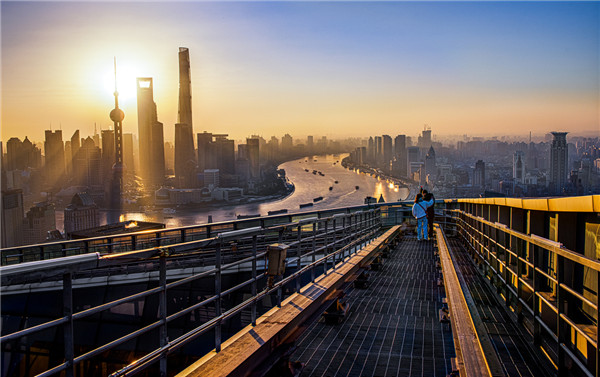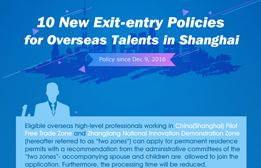Shanghai seeks to improve services for foreign talents

A view of the Bund and the Lujiazui financial area in Shanghai from the roof of the CITIC Plaza on Jan 1, 2021. [Photo by Fang Zhonglin/for China Daily]
Foreign experts in Shanghai lauded the city's attractive environment and gave suggestions to make it more livable for foreigners during the "Foreign experts look at Pudong" meeting with local government officials on Jan 17.
Foreigners' needs will be addressed, sorted out and more efforts will be made to facilitate foreigners' livelihoods in Shanghai, according to the Shanghai Administration of Foreign Experts Affairs, which hosted the event alongside the Science and Technology Commission of Shanghai Municipality and Pudong New Area.
The event's main purpose was to listen to foreigners' opinions of Shanghai who wish to live in the city for a long time and respond to their concerns as part of local efforts to attract and retain foreign talents.
"I have lived in Shanghai for 16 years and I love the city. However, I find that there are not enough digital service products for expats. For example, when I want to see what exhibitions are on display in Shanghai recently, I can't find one easy-to-use APP," said Rui Wufeng, a distinguished researcher at Tongji University.
Rui's words resonated with many foreign experts at the meeting who mentioned other inconspicuous troubles like "I want to register for an APP, but find that there is no access for foreigners," "I want to know the exhibition information but I don't know where to check it," and "I want to make an appointment to see the exhibition but I can't find the English interface".
Ma Ge, a distinguished professor at Shanghai University, said that due to language barriers, many apps cannot be registered, and those activities that require booking tickets in advance and making reservations are seldom available to foreigners.
Shanghai is currently undergoing an urban digital transformation, and more public facilities and services will be integrated into the digitalization process in the future. Relevant departments stated that Shanghai will "open a window" and "leave a door open" for more foreigners in the process of digital transformation, so that foreign experts participating in Shanghai's development can fully enjoy the convenience brought by the digital transformation of the city.
Ma also said that there are many parks in Pudong, which can be put to good use. In foreign countries, people like to run and ride bicycles in the parks. He hopes that Pudong can organize more activities to help foreigners expand their social circles, and make full use of the parks.
"My family and I like to live in Shanghai, and I am committed to bringing more scientists to Shanghai," said Yuichiro Nakai, a scholar from the Tsung-Dao Lee Institute. The Tsung-Dao Lee Institute's main goals are to gather the world's top elites, attract young scientists, and become a world-class scientific research institution.
"To build the world's top academic institutions, cultural facilities must keep up," Nakai said. Nakai also mentioned that Japan has also built similar academic institutions, but there are no public facilities such as museums and art galleries around, so scientific researchers will not be there after work and will fail to generate ideas that arise from exchanges. He noted that the Tsung-Dao Lee Institute attaches great importance to the integration of science and art, and the completion of a number of public facilities such as the Pudong Art Museum has also given researchers a few more reasons to like Pudong.
"Among the cities I have lived in, Shanghai is the most inclusive city. The cultures of different regions are well integrated here, showing a friendly image to the world," said Wang Ye, director of the project department of SEC-KSB. In Wang's opinion, inclusiveness is the biggest attraction of Shanghai. The company he works at is a Sino-German joint venture that provides high-end equipment for nuclear power plants. Wang said he found a stage to display his talents in Shanghai and he is very optimistic about the future.
Dong Linna, a language engineering expert at Shanghai Huawei Technologies Co Ltd and the youngest of all the foreign experts participating in the event, spoke on behalf of young people. "If a place is full of opportunities, young people will come," Dong said.
After 10 years of studying in China, she returned to teach for a year in Spain, where students are curious about the East. "I am a beneficiary of the China Scholarship Program. If Shanghai has more international cooperation and exchange programs to enhance exchanges between Chinese and foreign students, I believe that more people will learn about China and come to Shanghai," Dong added.
Having lived in Shanghai for 25 years, Noyan Rona, chief representative of the Shanghai Representative Office of Turkish Guarantee Bank Co Ltd, praised Shanghai's promptness in dealing with issues. Not long ago, he saw that a railing in the Lujiazui area was affecting traffic, so he proposed to remove it. A few days later, he received feedback that the railing had been removed.
Huang Hong, deputy director of the Shanghai Administration of Foreign Experts Affairs and deputy director of the Science and Technology Commission of Shanghai Municipality, said that support will be given to help Pudong New Area build itself into a leading area for developing international talents, launch more innovative policies and measures for foreign talent management services, and accelerate building a talents system with global competitiveness.
Over the past 30 years, Pudong has attracted global talents with its open and convenient talent policies, high-level innovation and entrepreneurship services, and a high-quality international environment that supports the development of talents.

 Print
Print Mail
Mail




